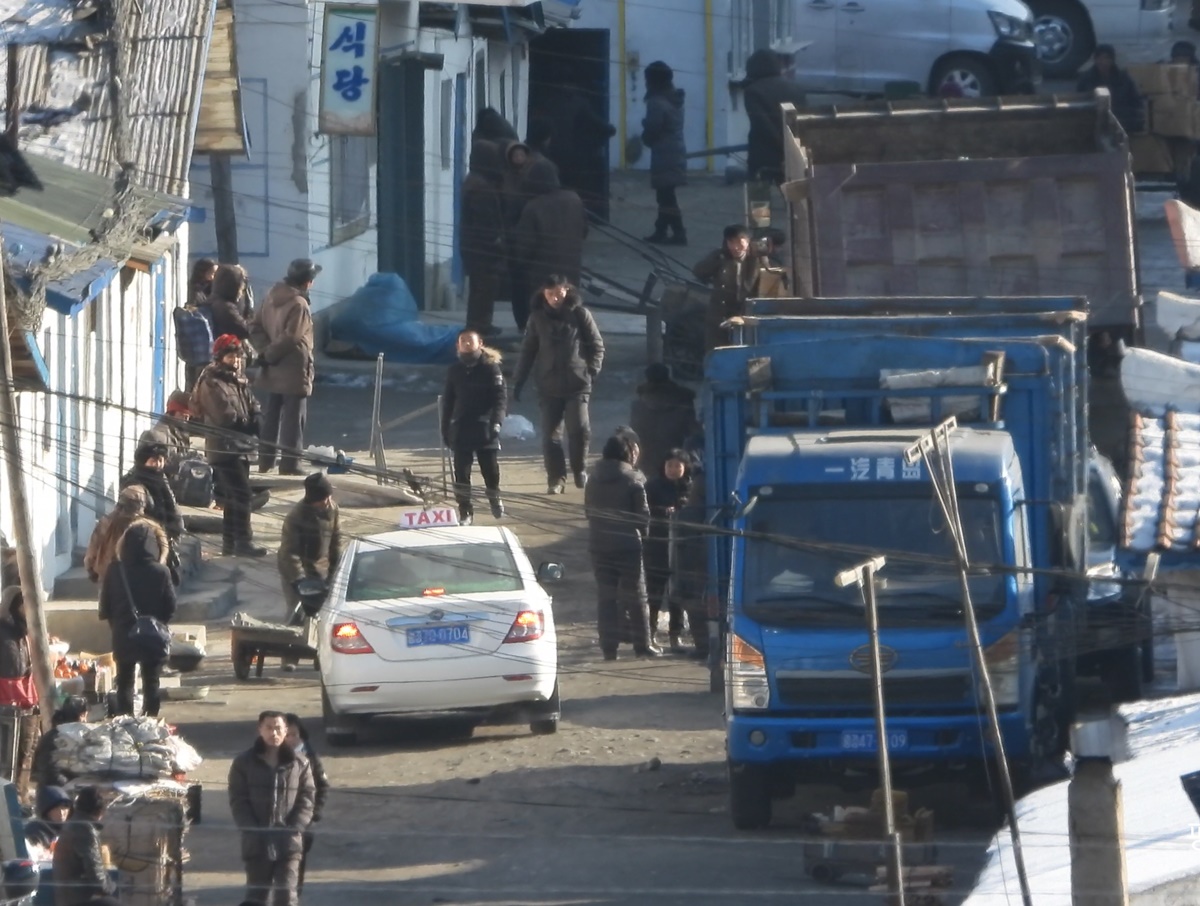 In this undated photo, North Koreans can be seen selling goods on the street in the North Korea-China border region. (Kang Dong Wan, Donga University)
In this undated photo, North Koreans can be seen selling goods on the street in the North Korea-China border region. (Kang Dong Wan, Donga University)Small electronics factories are sprouting up across Chinese border towns, quietly manufacturing devices specifically for North Korean consumers. These operations produce everything from portable media players to rechargeable LCD TVs, all destined for smuggling across the border—and they’re changing how North Koreans consume culture.
The factories have mushroomed throughout border regions in Jilin and Liaoning provinces, typically occupying modest spaces of around 660 square meters or less. While their official paperwork might claim they manufacture phone parts or portable chargers, their real business is serving North Korean demand.
“These are small-scale operations,” explained a Daily NK source in China recently. “Most have about 20 assembly lines with 15 to 30 workers, and they rely heavily on manual labor or basic automation.” The factories deliberately design their products with North Korea’s chronic electricity shortages in mind, ensuring everything is rechargeable.
North Korean smugglers often place specific requests: devices that can’t record, readers limited to text files only, or products in particular colors. Most notably, factories now strip away brand names entirely—a shift from earlier days when devices carried logos like “MP8.” This rebrand to anonymity appears designed to help the devices slip past North Korean surveillance.
The business model runs on advance payments from trading companies or private investors, often backed by Chinese regional governments. While local authorities don’t directly manage these operations, they work through commissioned trading firms and businesspeople to ensure steady production and reliable profits for factory operators.
A shift in content strategy
The type of media these devices carry has evolved significantly. Previously, manufacturers would pre-load sensitive content like South Korean dramas and K-pop directly onto devices. Now, fearing crackdowns, they distribute most South Korean content separately on USB drives and SD cards.
Instead, the devices now come packed with Chinese entertainment: TV dramas, variety shows, pop music, and martial arts films. This content serves a dual purpose—entertainment for North Koreans and a window into Chinese society and culture.
“People in North Korea are increasingly drawn to Chinese videos because of their high production quality and educational value,” the source said. “There’s growing interest in Chinese family dynamics and urban lifestyle.” This cultural influence aligns with what appears to be China’s broader goal of introducing North Korea to what it considers more “civilized” standards.
Chinese local governments and police are well aware of these factories but consistently choose to look the other way rather than enforce crackdowns. While authorities occasionally conduct tax audits or health inspections, they rarely address the operations’ clear connections to North Korea or their violation of international sanctions.
“Local governments see no downside to these factories,” the source explained. “They boost the local economy and provide livelihoods for small business owners. When you consider the strategic benefit of exposing North Koreans to Chinese content, some regions actually encourage this activity.”
Meanwhile, North Korea has launched an intensive campaign against Chinese-made electronics. However, many residents believe the authorities are fighting a losing battle.
A source in North Korea reported that even the families of state security officers and inspectors “use these devices more than anyone else.” The crackdowns “can’t keep pace because the devices keep flowing in through invisible channels” from China.
This underground trade represents more than simple commerce—it’s quietly reshaping North Korean cultural consumption and potentially softening the ground for broader Chinese influence in the isolated nation.
